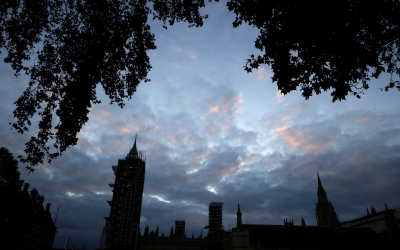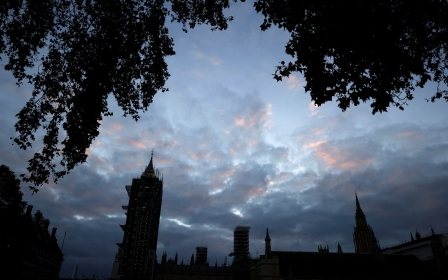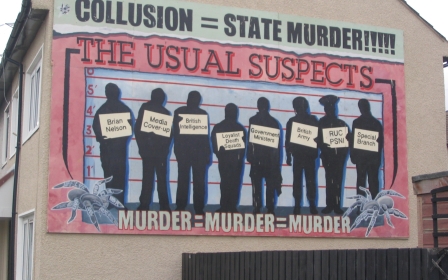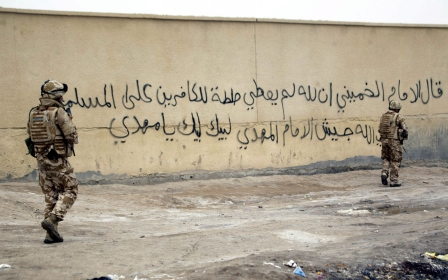UK bill shielding soldiers from war crimes charges challenged in House of Lords

The British government’s attempts to shield its armed forces from prosecution for torture, war crimes and even genocide is facing stiff opposition in the upper house of the country’s parliament.
Its deeply controversial Overseas Operations Bill has enjoyed easy passage in the elected lower house, the Commons, partly because the government enjoys an 80-seat majority, and partly because the opposition Labour party had declined to oppose the measure.
In the unelected House of Lords, however - where the bill has been widely denounced as a dangerous and shameful measure - repeated attempts have been made to amend it to ensure serious crimes committed by the UK’s armed forces can still result in prosecution.
On Tuesday, an amendment moved by George Robertson, a former UK defence secretary and secretary-general of Nato, sought to remove torture, war crimes and genocide from the bill’s provisions, meaning these crimes would still be prosecuted.
The amendment was carried overwhelmingly with cross-party support.
There remain concerns, however, that the government will steamroll the bill through the House of Commons, which can reject or suggest alternative or additional amendments to those proposed by the Lords, as early as next month.
The proposed law would introduce a presumption against prosecution for offences other than sexual assault; a five-year statute of limitations; and prosecutions would require the permission of the attorney general.
The UK’s Ministry of Defence says it is intended to bring to an end a series of investigations into the conduct of UK service personnel in Iraq and Afghanistan in conflicts since 2001.
The bill’s opponents say these investigations have needed to be repeated only because they have been inadequate.
They also say that claims that it will protect members of the armed forces from “vexatious” compensation cases are disingenuous, as such cases are brought against the defence ministry and not against individual soldiers.
'Lasting and serious damage'
Robertson said the proposed law would inflict “lasting and serious damage” to the reputation of the UK and its armed forces. “Reasonable and honourable people can only be dismayed,” he told the Lords.
Any attempt to shield British troops from prosecution under UK law raises the prospect of them appearing before the International Criminal Court at The Hague, he said.
The bill was “bad for our troops, bad for our legal system and very bad for our international reputation”.
Defence Minister Annabel Goldie told the Lords that the presumption against prosecution was not a de facto amnesty, and that the British government continued to take criminal offences seriously.
A number of experts in the laws of armed conflict have raised concerns that the proposed measures would violate international law, by undermining the Geneva Conventions and the United Nations Convention Against Torture.
The country's most senior former soldier, Charles Guthrie, a field marshal who served as both chief of the general staff and chief of the defence staff, has written to the press to complain, saying: "These proposals appear to have been dreamt up by those who have seen too little of the world to understand why the rules of war matter.
'These proposals appear to have been dreamt up by those who have seen too little of the world to understand why the rules of war matter'
- Field Marshal Charles Guthrie
"If we start down the slippery slope of arguing that rules apply to others, but not to ourselves, it is we who will suffer in the end."
Critics have also pointed out that the proposed law would mean a British soldier who rapes and murders a woman could be prosecuted for rape, but may escape prosecution for murder.
The outgoing chief prosecutor at the ICC, Fatou Bensouda, has warned that the passing of the law could result in the court deciding that the UK could no longer investigate its own troops’ crimes.
In a statement on the Overseas Operations Bill, Bensouda's office said: "Were such domestic legislation to be adopted, the office would need to consider its potential impact on the ability of the UK authorities to investigate and/or prosecute crimes allegedly committed by members of the British armed forces in Iraq."
A number of British soldiers have been prosecuted following the torture of detainees in Iraq, and the courts in London have heard that British troops have complained about the killing of unarmed civilians in Afghanistan.
One episode was described by a British non-commissioned officer, in an email, as “the latest massacre”.
The UK defence secretary has been told by the courts that he must explain why his department sought to conceal the killing of 33 Afghan civilians early in 2011.
Middle East Eye delivers independent and unrivalled coverage and analysis of the Middle East, North Africa and beyond. To learn more about republishing this content and the associated fees, please fill out this form. More about MEE can be found here.





